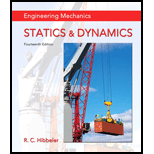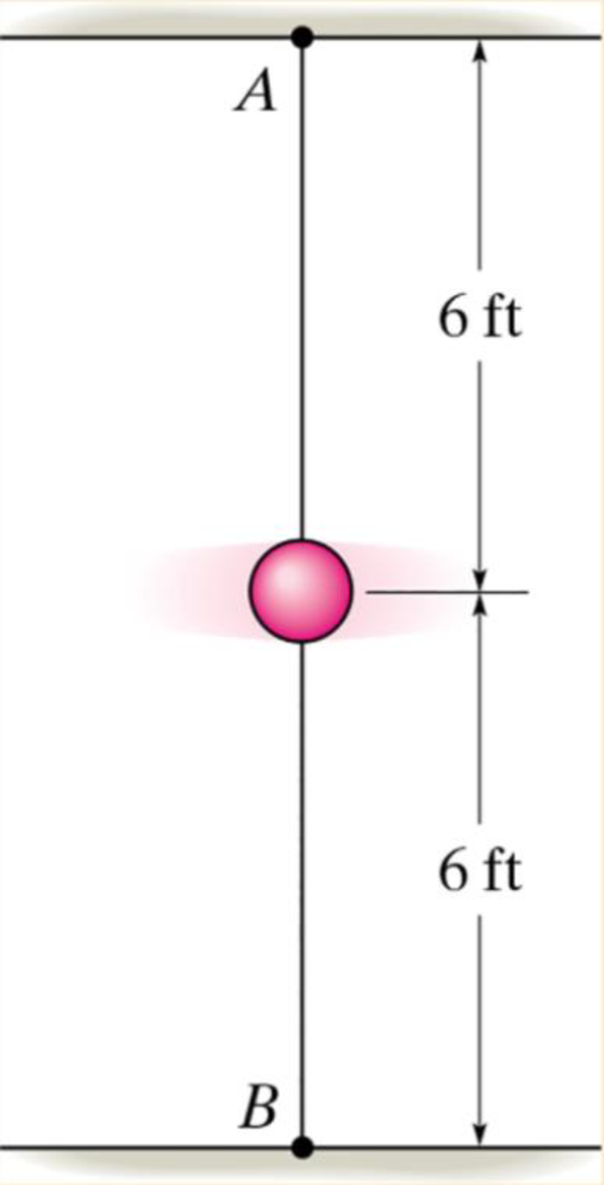
Engineering Mechanics: Statics & Dynamics (14th Edition)
14th Edition
ISBN: 9780133915426
Author: Russell C. Hibbeler
Publisher: PEARSON
expand_more
expand_more
format_list_bulleted
Concept explainers
Textbook Question
Chapter 22.1, Problem 21P
If the wire AB is subjected to a tension of 20 lb, determine the equation which describes the motion when the 5-lb weight is displaced 2 in. horizontally and released from rest.

Expert Solution & Answer
Want to see the full answer?
Check out a sample textbook solution
Students have asked these similar questions
The simple 2.3-kg pendulum is released from rest in the horizontal position. As it reaches the bottom position, the cord wraps around
the smooth fixed pin at B and continues in the smaller arc in the vertical plane. Calculate the magnitude of the force R supported by the
pin at B when the pendulum passes the position 8 = 43°
330
mm
2.3 kg
B
Answer: R= i
90°
720
mm
N
Determine the steady-state angle a if the constant force P = 195 N is applied to the cart of mass M = 16 kg. The cart travels on the
slope of angle 0 = 25° The pendulum bob has mass m = 4 kg and the rigid bar of length L = 1.1 m has negligible mass. Ignore all friction.
P
M
L
m
The elevator E and its freight have a total weight of 869.4 lb.
Hoisting is provided by the motor M and the counterweight C
which weighs 128.8 lb. At the instant shown, the elevator is
moving upward with a velocity of 15 ft/s and an upward
acceleration of 4 ft's?. Hint: draw a free-body diagram of the
counterweight and then of the elevator.
• Determine the tension in the counterweight cable.
Determine the tension in the motor cable.
Determine the power output of the motor.
Chapter 22 Solutions
Engineering Mechanics: Statics & Dynamics (14th Edition)
Ch. 22.1 - A spring is stretched 175 mm by an 8-kg block. If...Ch. 22.1 - A spring has a stiffness of 800 N/m. If a 2-kg...Ch. 22.1 - Prob. 3PCh. 22.1 - Prob. 4PCh. 22.1 - Prob. 5PCh. 22.1 - Prob. 6PCh. 22.1 - Prob. 7PCh. 22.1 - Prob. 8PCh. 22.1 - A 3-kg block is suspended from a spring having a...Ch. 22.1 - Prob. 10P
Ch. 22.1 - While standing in an elevator, the man holds a...Ch. 22.1 - Determine the natural period of vibration of the...Ch. 22.1 - Prob. 13PCh. 22.1 - Prob. 14PCh. 22.1 - Prob. 15PCh. 22.1 - Prob. 16PCh. 22.1 - Prob. 17PCh. 22.1 - The uniform beam is supported at its ends by two...Ch. 22.1 - Prob. 19PCh. 22.1 - A uniform board is supported on two wheels which...Ch. 22.1 - If the wire AB is subjected to a tension of 20 lb,...Ch. 22.1 - The bar has a length l and mass m. It is supported...Ch. 22.1 - Prob. 23PCh. 22.1 - Prob. 24PCh. 22.1 - If the disk in Prob. 22-24 has a mass of 10 kg,...Ch. 22.1 - A flywheel of mass m which has a radius of...Ch. 22.1 - Prob. 27PCh. 22.1 - The platform AB when empty has a mass of 400 kg...Ch. 22.1 - The plate of mass m is supported by three...Ch. 22.2 - Prob. 30PCh. 22.2 - Prob. 31PCh. 22.2 - Prob. 32PCh. 22.2 - If the 20-kg wheel is displaced a small amount and...Ch. 22.2 - Determine the differential equation of motion of...Ch. 22.2 - Prob. 35PCh. 22.2 - Prob. 36PCh. 22.2 - Prob. 37PCh. 22.2 - Prob. 38PCh. 22.2 - Prob. 39PCh. 22.2 - If the slender rod has a weight of 5 lb, determine...Ch. 22.6 - If the block-and-spring model is subjected to the...Ch. 22.6 - A block which has a mass m is suspended from a...Ch. 22.6 - A 4-lb weight is attached to a spring having a...Ch. 22.6 - A 4-kg block is suspended from a spring that has a...Ch. 22.6 - Use a block-and-spring model like that shown in...Ch. 22.6 - A 5-kg block is suspended from a spring having a...Ch. 22.6 - The uniform rod has a mass of m. If it is acted...Ch. 22.6 - Prob. 48PCh. 22.6 - The light elastic rod supports a 4-kg sphere. When...Ch. 22.6 - Find the differential equation for small...Ch. 22.6 - Prob. 51PCh. 22.6 - Prob. 52PCh. 22.6 - The fan has a mass of 25 kg and is fixed to the...Ch. 22.6 - In Prob. 22-53 , determine the amplitude of...Ch. 22.6 - Prob. 55PCh. 22.6 - Prob. 56PCh. 22.6 - Prob. 57PCh. 22.6 - Prob. 58PCh. 22.6 - Prob. 59PCh. 22.6 - Prob. 60PCh. 22.6 - Prob. 61PCh. 22.6 - Prob. 62PCh. 22.6 - Prob. 63PCh. 22.6 - Prob. 64PCh. 22.6 - Prob. 65PCh. 22.6 - Determine the magnification factor of the block,...Ch. 22.6 - Prob. 67PCh. 22.6 - The 200-lb electric motor is fastened to the...Ch. 22.6 - Prob. 69PCh. 22.6 - Prob. 70PCh. 22.6 - If the amplitude of the 50-lb cylinder's...Ch. 22.6 - Prob. 72PCh. 22.6 - Prob. 73PCh. 22.6 - Prob. 74PCh. 22.6 - Prob. 75PCh. 22.6 - Prob. 76PCh. 22.6 - Prob. 77PCh. 22.6 - Prob. 78PCh. 22.6 - Prob. 79P
Knowledge Booster
Learn more about
Need a deep-dive on the concept behind this application? Look no further. Learn more about this topic, mechanical-engineering and related others by exploring similar questions and additional content below.Similar questions
- The small block B is attached to the vertex A of the right circular cone using a light cord. The cone is rotating at a constant angular velocity about the vertical z-axis such that the block attains a speed of 0.6 m/sec. If the mass of the block is 0.3 kg, determine the tension in the cord by neglecting friction and the size of the block. Present your answer in Newtons using 3 significant figures. 200 mm B 300 mm A 400 mmarrow_forwardThe T-shaped body of total mass m = 6.5 kg is constructed of uniform rod. If it is released from rest while in the position shown, determine the vertical force reaction at O as it passes the vertical position (124° after release). The distance b is 1.04 m.arrow_forwardThe flat circular disk rotates about a vertical axis through O with a slowly increasing angular velocity w. Prior to rotation, each of the 0.52-kg sliding blocks has the position x = 28 mm with no force in its attached spring. Each spring has a stiffness of 430 N/m. Determine the value of x for each spring for a steady speed of 279 rev/min. Also calculate the normal force N exerted by the side of the slot on the block. The force N is positive if it pushes from the side labeled A. Neglect any friction between the blocks and the slots, and neglect the mass of the springs. (Hint: Sum forces along and normal to the slot.) Answers: X = wwwwwwww N = i i -74-74- mm mm mm Narrow_forward
- C14-2. As the large ring rotates, the operator can apply a breaking mechanism that binds the cars to the ring, which then allows the cars to rotate with the ring. Assuming the passengers are not belted into the cars, determine the smallest speed of the ring (cars) so that no passenger will fall out. When should the operator release the brake so that the cars can achieve their greatest speed as they slide freely on the ring? Estimate the greatest normal force of the seat on a passenger when this speed is reached. Use numerical values to explain your answer.arrow_forward2. The 30-lb collar A begins at rest in the position shown. Under the influence of a constant 50-lb force P the collar slides up the fixed rod inclined 30° above the horizontal. Identify the required stiffness k of the spring so that the collar is brought to rest when the spring is compressed 6 inches. The pulley B is fixed at its position. B 30 40" 30-arrow_forwardPlease solve this question in dynamicsarrow_forward
- The mechanism shows two identical 2-kg bars that are 0.15 m long each. They are hinged together at the lower ends and are supported at the upper ends by small rollers of negligible mass which roll on a horizontal rail. Determine the steady state angle assumed by the bars when they are accelerating under the action of a constant horizontal force FN. Also, find the forces on the rollers at A and B as well as the reactions at the hinge C. Take the value of the force F is equal to 123.45 Newtons.arrow_forwardSolve the problem correctlyarrow_forwardDetermine the steady-state angle a if the constant force P = 170 N is applied to the cart of mass M = 43 kg. The cart travels on the slope of angle 0 = 17°. The pendulum bob has mass m = 9 kg and the rigid bar of length L = 1.1 m has negligible mass. Ignore all friction. M L m Answer: a = iarrow_forward
- Also include free body diagramarrow_forwardTwo bodies A and B, each weighing 96.6 lb, are connected by a rigid bar of negligible weight attached to them at their gravity centers. The coefficient of friction at the wall and floor is 0.268 if the bodies start from rest at the given position, determine the acceleration of B at this instant. Simplify the solution by creating dynamic equilibrium and taking a moment summation about the intersection of the wall and floor reactions. Explain why these reactions pass through the gravity center of B and A respectively.arrow_forwardThe body A with a mass of 50 kg is in equilibrium with the help of the pulling force generated in the AB and AC cables in the middle of the inclined plane and the friction force between the curved surface and the object. The friction force is on the line of motion of body A and develops in the opposite direction to the movement in the direction of the arrow shown in the drawing. Since the pulling force in AB and AC cables is 15.1 and 22.1 N, respectively, calculate the balancer friction force acting on the object vectorially? (g = 9.81 m / s'2)arrow_forward
arrow_back_ios
SEE MORE QUESTIONS
arrow_forward_ios
Recommended textbooks for you
 Elements Of ElectromagneticsMechanical EngineeringISBN:9780190698614Author:Sadiku, Matthew N. O.Publisher:Oxford University Press
Elements Of ElectromagneticsMechanical EngineeringISBN:9780190698614Author:Sadiku, Matthew N. O.Publisher:Oxford University Press Mechanics of Materials (10th Edition)Mechanical EngineeringISBN:9780134319650Author:Russell C. HibbelerPublisher:PEARSON
Mechanics of Materials (10th Edition)Mechanical EngineeringISBN:9780134319650Author:Russell C. HibbelerPublisher:PEARSON Thermodynamics: An Engineering ApproachMechanical EngineeringISBN:9781259822674Author:Yunus A. Cengel Dr., Michael A. BolesPublisher:McGraw-Hill Education
Thermodynamics: An Engineering ApproachMechanical EngineeringISBN:9781259822674Author:Yunus A. Cengel Dr., Michael A. BolesPublisher:McGraw-Hill Education Control Systems EngineeringMechanical EngineeringISBN:9781118170519Author:Norman S. NisePublisher:WILEY
Control Systems EngineeringMechanical EngineeringISBN:9781118170519Author:Norman S. NisePublisher:WILEY Mechanics of Materials (MindTap Course List)Mechanical EngineeringISBN:9781337093347Author:Barry J. Goodno, James M. GerePublisher:Cengage Learning
Mechanics of Materials (MindTap Course List)Mechanical EngineeringISBN:9781337093347Author:Barry J. Goodno, James M. GerePublisher:Cengage Learning Engineering Mechanics: StaticsMechanical EngineeringISBN:9781118807330Author:James L. Meriam, L. G. Kraige, J. N. BoltonPublisher:WILEY
Engineering Mechanics: StaticsMechanical EngineeringISBN:9781118807330Author:James L. Meriam, L. G. Kraige, J. N. BoltonPublisher:WILEY

Elements Of Electromagnetics
Mechanical Engineering
ISBN:9780190698614
Author:Sadiku, Matthew N. O.
Publisher:Oxford University Press

Mechanics of Materials (10th Edition)
Mechanical Engineering
ISBN:9780134319650
Author:Russell C. Hibbeler
Publisher:PEARSON

Thermodynamics: An Engineering Approach
Mechanical Engineering
ISBN:9781259822674
Author:Yunus A. Cengel Dr., Michael A. Boles
Publisher:McGraw-Hill Education

Control Systems Engineering
Mechanical Engineering
ISBN:9781118170519
Author:Norman S. Nise
Publisher:WILEY

Mechanics of Materials (MindTap Course List)
Mechanical Engineering
ISBN:9781337093347
Author:Barry J. Goodno, James M. Gere
Publisher:Cengage Learning

Engineering Mechanics: Statics
Mechanical Engineering
ISBN:9781118807330
Author:James L. Meriam, L. G. Kraige, J. N. Bolton
Publisher:WILEY
Dynamics - Lesson 1: Introduction and Constant Acceleration Equations; Author: Jeff Hanson;https://www.youtube.com/watch?v=7aMiZ3b0Ieg;License: Standard YouTube License, CC-BY